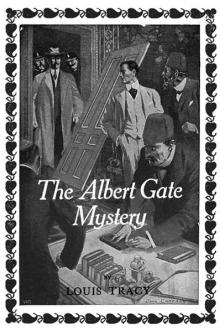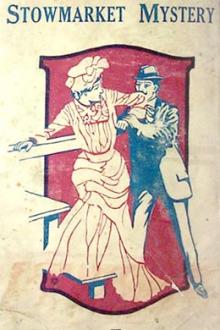The Albert Gate Mystery by Louis Tracy (short novels in english txt) 📕

- Author: Louis Tracy
- Performer: -
Book online «The Albert Gate Mystery by Louis Tracy (short novels in english txt) 📕». Author Louis Tracy
The Project Gutenberg EBook of The Albert Gate Mystery, by Louis Tracy
This eBook is for the use of anyone anywhere at no cost and with
almost no restrictions whatsoever. You may copy it, give it away or
re-use it under the terms of the Project Gutenberg License included
with this eBook or online at www.gutenberg.org
Title: The Albert Gate Mystery
Being Further Adventures of Reginald Brett, Barrister Detective
Author: Louis Tracy
Release Date: October 22, 2007 [EBook #23150]
Language: English
*** START OF THIS PROJECT GUTENBERG EBOOK THE ALBERT GATE MYSTERY ***
Produced by D. Alexander and the Online Distributed
Proofreading Team at http://www.pgdp.net (This file was
produced from images generously made available by The
Internet Archive)
The Albert Gate Mystery Being Further Adventures of Reginald Brett, Barrister Detective By LOUIS TRACY Author of "Wings of the Morning," "The Stow-market Mystery,"
"The Final War," Etc., Etc.
title
R. F. FENNO & COMPANY
9 & 11 East 16th Street, New York :: 1904 Copyright, 1904
By R. F. Fenno & Company
i_1
Hussein-ul-Mulk
—Frontispiece
Reginald Brett, barrister-at-law and amateur detective, had seldom been more at peace with the world and his own conscience than when he entered the dining-room of his cosy flat this bright October morning.
Since the famous affair of Lady Delia Lyle's disappearance and death, he had not been busy, and the joy of healthy idleness is only known to the hard worker. Again, while dressing, he had received a letter inviting him to a quiet shoot at a delightful place in the country.
All these things blended with happy inconsequence to render Brett contented in mind and affable in manner.
"It's a fine morning, Smith," he said cheerily, as he settled himself at the table where his "man" was already pouring out the coffee.
"Bee-utiful, sir," said Smith.
"Smith!"
"Yessir."
"Not even the best English autumn weather can stand being called 'bee-utiful.' Don't do it. You will open the flood-gates of Heaven."
Smith laughed decorously. He had not the slightest idea what his master meant, but if it pleased Mr. Brett to be jocose, it was the duty of a servant who knew his place to be responsive.
The barrister fully understood Smith's delicate appreciation—and its limits. He instantly noticed that the morning paper, instead of reposing next to his folded napkin, was placed out of reach on a sideboard, and that the eggs and bacon made their appearance half a minute too soon.
As an expert swordsman delights to execute a pass en tierce with an umbrella, so did the cleverest analytical detective of the age resolve to amaze his servitor.
"Smith," he said suddenly, composing his features to their most severe cross-examination aspect, "I think the arrangement is an excellent one."
"What arrangement, sir."
"That Mrs. Smith and yourself should have a few days' holiday, while Mrs. Smith's brother takes your place during my forthcoming visit to Lord Northallerton's—why, man, what is the matter? Is it too hot?"—for the cover Smith had lifted off the bacon and eggs clattered violently on the table.
"'Ot, sir. 'Ot isn't the word. You're a fair licker, that's what you are."
Smith invariably dropped his h's when he became excited.
"Smith, I insist that you shall not call me names. Pass the paper."
"But, sir——"
"Pass the paper. Utter another word and I refuse to accept Mrs. Smith's brother as your locum tenens."
Smith was silenced by the last terrible epithet. Yet he was so manifestly nervous that Brett resolved to enlighten him before plunging into the day's news.
"For the last time, Smith," he said, "I will explain to you why it is hopeless for you to think of concealing tradesmen's commissions from me."
The shot went home, but the enemy was acquainted with this method of attack, and did not wince.
"You knew that Lord Northallerton had recently invited me to his October pheasant-shooting. During the last few days a youth, who grotesquely reproduces Mrs. Smith's most prominent features, has mysteriously tenanted the kitchen, ill-cleaned my boots, and bungled over the studs in my shirts. This morning a letter came with the crest and the Northallerton postmark. Really, Smith, considering that you have now breathed the same air as myself for eight long years, I did not expect to be called on for an explanation. Besides, you have destroyed a masterpiece."
"Sir——" began Smith.
"Oh, I understand; there is nothing broken but your reputation. Don't you see that the mere placing of the newspaper at a distance, so that you might have a chance to speak before I opened it, was a subtle stroke, worthy of Lecocq. Yet you demand feeble words. What a pity! Know, Smith, that true genius is dumb. Speech may be silvern, but silence is surely golden."
The barrister solemnly unfolded the paper, and Smith faded from the room. On a page usually devoted to important announcements, the following paragraphs stood forth in the boldness of leaded type:—
"Mysterious Occurrence in the West End.
"An affair of some magnitude—perhaps a remarkable crime—has taken place in an Albert Gate mansion.
"Owing to the reticence of the authorities, it is at present impossible to arrive at a definite conclusion as to the nature or extent of the incident, but it is quite certain that public interest will be much excited when details are forthcoming. All sorts of rumours attain credence in the locality, the murder of several prominent persons being not the least persistent of these. Without, however, giving currency to idle speculation, several authentic statements may be grouped into a connected form.
"Four weeks ago a party of Turkish gentlemen of high rank in Constantinople, arrived in London and took up their abode in the house in question, after some structural alterations, pointing at great security within and without, had been planned and executed.
"Attending these Turkish gentlemen, or officials, was a numerous suite of Moslem guards and servants, whilst, immediately following their arrival, came from Amsterdam some dozen noted experts in the diamond-cutting industry. These were lodged in a neighbouring private hotel, where they were extremely uncommunicative as to their business in London. They were employed during the day at the Albert Gate house. The presence in the mansion, both day and night, of a strong force of Metropolitan police, tended to excite local curiosity to an intense degree, but no clear conception of the business of the occupants was allowed to reach the public.
"Whatever it was that took place, the full particulars were not only well known to the authorities—the presence of the police hints even at Governmental sanction—but matters proceeded on normal lines until yesterday morning.
"Then it became clear that a remarkable development must have occurred during the preceding night, as the whole of the Dutch workmen and the Turkish attendants were taken off in cabs by the police, not to Morton Street Police Station, but to Scotland Yard; this in itself being a most unusual course to adopt. They are unquestionably detained in custody, but they have not yet been charged before a magistrate.
"The police, later in the day, carried off some of these men's personal belongings, from both hotel and mansion.
"A sinister aspect was given to the foregoing mysterious proceedings by the presence at Albert Gate, early in the day, of two police surgeons, who were followed, about twelve o'clock, by Dr. Tennyson Coke, the greatest living authority on toxicology.
"Dr. Coke and the other medical gentlemen subsequently refused to impart the slightest information as to the reasons that led the police to seek their services, and the Scotland Yard authorities are adamant in the matter.
"The representative of a news agency was threatened with arrest for trespass when he endeavoured to gain admission to the Albert Gate house, and it is quite evident that the police are determined to prevent the facts from leaking out at present—if they can by any means accomplish their wishes."
Brett read this interesting statement twice slowly. It fascinated him. Its very vagueness, its admissions of inability to tell what had really happened, its adroit use of such phrases as "Turkish gentlemen of high rank," "Noted experts in the diamond-cutting industry," "The greatest living authority on toxicology," betrayed the hand of the disappointed journalistic artist.
"Excellent!" he murmured aloud. "It is the breath of battle to my nostrils. I ought to tip Smith for my breakfast. Had I read this earlier, I would not have eaten a morsel."
He carefully examined the page at the back. It contained matter of no consequence—a London County Council debate—so he took a pair of scissors from his pocket and cut out the complete item, placing the slip as a votive offering in front of a finely-executed bust of Edgar Allen Poe, that stood on a bookcase behind him.
Within three minutes the scissors were again employed. The new cutting ran—
"There is trouble at Yildiz Kiosk. A Reuter's telegram from Constantinople states that a near relative of the Sultan has fled to France. The Porte have asked the French Government to apprehend him, but the French Ambassador has informed Riaz Pasha that this course is impracticable in the absence of any criminal charge."
"These two are one," said the barrister, as he turned towards Poe's bust and laid the slip by the side of its predecessor. This time he had mutilated a critique of an Ibsensite drama.
The rest of the newspaper's contents had no special interest for him, and he soon threw aside the journal in order to rise, light a cigarette, and muster sufficient energy to write a telegram accepting Lord Northallerton's invitation for the following day.
He was on the point of reaching for a telegraph form when Smith entered with a card. It bore the name and address—
"The Earl of Fairholme, Stanhope Gate."
"Curious," thought Brett. "Where is his lordship?" he said aloud—"at the door, or in the street?"
(His flat was on the second floor.)
"In a keb, sir."
"Bring his lordship up."
A rapid glance at "Debrett" revealed that the Earl of Fairholme was thirty, unmarried, the fourteenth of his line, and the possessor of country seats at Fairholme, Warwickshire, and Glen Spey, Inverness.
The earl entered, an athletic, well-groomed man, one whose lines were usually cast in pleasant places, but who was now in an unwonted state of flurry and annoyance.
Each man was favourably impressed by the other. His lordship produced an introductory card, and Brett was astonished to find that it bore the name of the Under-Secretary of State for Foreign Affairs.
"I have come——" commenced his lordship hesitatingly.
But the barrister broke in. "You





Comments (0)